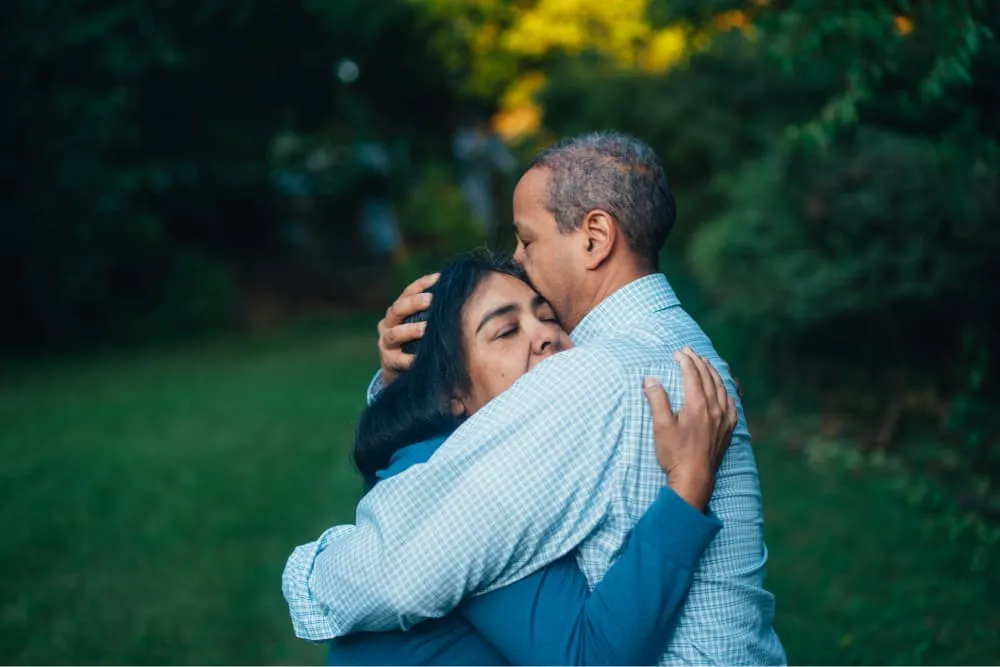The continuum of eating disorder care
Eating disorder recovery doesn’t end after you complete your initial treatment program—recovery is a lifelong process, and many patients find success in making their way through the continuum of care. Everyone’s needs are different, but a typical treatment plan may include: (1)
- Admitting to an inpatient or residential program
- Stepping down to a partial hospitalization or intensive outpatient program IOP)
- Stepping down to a standard outpatient program
- Receiving ongoing therapy or wraparound services for as long as needed
Many patients find it jarring to graduate or discharge from an inpatient or residential program and return home, where there may be many relapse triggers and life stressors. Aftercare and follow-up support is crucial to long-term recovery.
When you move through this continuum of care, you receive comprehensive, integrated, and individualized eating disorder treatment while slowly transitioning from an intensive treatment setting to less intensive settings. This gradual transition can help you feel more comfortable and confident in your ability to refrain from disordered eating while building upon skills you learned in treatment.
The continuum of care is based on two main principles, which include: (1)
- A patient starts with the least restrictive care option
- Treatment providers continually monitor and adjust treatment depending on efficacy
As such, the continuum of care can be navigated in either direction, and it’s not necessarily linear. If you complete an IOP and find that you are struggling with a lower level of care or have relapsed to disordered eating, you can always enter a partial hospitalization program or even residential again. There is no one way to move through this stepped continuum—it is individualized. (1)
What are wraparound services?
Wraparound refers to services and support that a person receives after they complete an eating disorder treatment program. It’s called this because the services “wrap around” the patient, providing them with strengths-based, comprehensive, needs-driven, and person-centric care. (2)
Wraparound builds upon patient strengths to achieve goals, improve well-being, improve functioning, and prevent relapse. These services are collaborative as well, working directly with the patient to address their needs. The main principles of wraparound services include: (2)
- Team-based
- Strengths-based
- Utilizing formal and natural support system
- Integrated and collaborative
- Community-based
- Patient-centered
- Culturally responsive
- Individualized
- Goal-oriented
For example, if you complete a residential program and begin individual outpatient counseling, you may want to receive wraparound services, such as remote care, a support group, group therapy, and/or nutritional counseling, all of which can add additional treatment support. Everyone’s needs are different, so the aftercare and wraparound support you receive will depend on your needs and goals.
No matter what wraparound services are best for you, the key is that all of the treatment professionals involved communicate with one another to provide you with integrated, seamless care.
How Within Health fills the treatment gap after residential or PHP
Telehealth or remote care can increase access to high-quality eating disorder treatment, especially for those experiencing barriers to care like location or transportation. It is also convenient for those who need to work around their busy schedules.
Within Health is a remote eating disorder treatment program that offers individualized and comprehensive telehealth care from wherever you feel most comfortable. While Within Health offers address the treatment gap between inpatient care and PHP, we also offer flexibility and wraparound care to those who need it.
When a patient transitions out of a residential program, they often need more support than they get from their outpatient treatment. At Within, we provide support to outpatient clinicians by filling this gap and providing our patients with holistic and integrated care. This type of care may involve group therapy, meal support, experiential therapies like art therapy or dance therapy, family therapy, as well as support from a Care Partner.
A Care Partner can be particularly helpful in stressful or triggering situations in which you may need guidance or emotional support, such as when you are:
- Shopping for clothes
- Grocery shopping
- Meal planning
- Cooking
They can also help you with any life skills you may need, such as organization or planning your self-care routine.
We work with patients’ needs and schedule services when they’re most convenient for you. For example, you may eat breakfast remotely with your group then attend work and outpatient therapy then return home in the evenings to have dinner with your group as well as group counseling. Alternatively, you may choose to work with Within treatment providers for the first few hours of the day then attend outpatient treatment. No matter your schedule, we are able to adapt our treatment hours to ensure you receive the additional support and wraparound services you need to be successful in your recovery.



















































